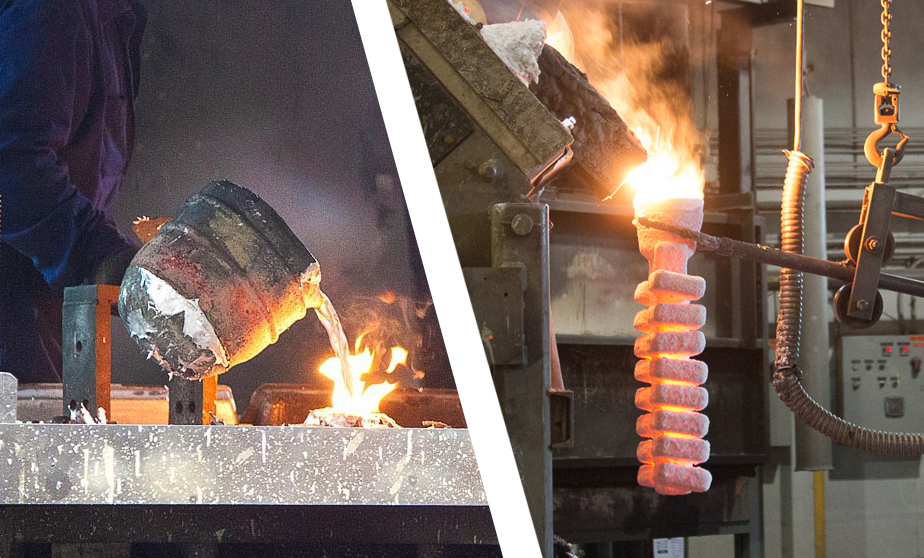The Stahl Specialty Company Diaries
The Stahl Specialty Company Diaries
Blog Article
Unknown Facts About Stahl Specialty Company
Table of ContentsThe 7-Minute Rule for Stahl Specialty CompanyThe Main Principles Of Stahl Specialty Company Indicators on Stahl Specialty Company You Should KnowGetting The Stahl Specialty Company To WorkThe Best Guide To Stahl Specialty Company
The subtle distinction depends on the chemical web content. Chemical Contrast of Cast Light weight aluminum Alloys Silicon promotes castability by decreasing the alloy's melting temperature level and improving fluidity throughout spreading. It plays an essential function in allowing intricate mold and mildews to be filled properly. Furthermore, silicon adds to the alloy's toughness and use resistance, making it valuable in applications where toughness is vital, such as auto parts and engine components.It also boosts the machinability of the alloy, making it simpler to process right into ended up products. In this way, iron contributes to the total workability of light weight aluminum alloys.
Manganese adds to the strength of light weight aluminum alloys and boosts workability. It is typically utilized in functioned light weight aluminum items like sheets, extrusions, and profiles. The existence of manganese aids in the alloy's formability and resistance to breaking throughout construction procedures. Magnesium is a light-weight component that supplies toughness and impact resistance to aluminum alloys.
It enables the manufacturing of lightweight elements with exceptional mechanical buildings. Zinc boosts the castability of light weight aluminum alloys and assists control the solidification procedure throughout spreading. It boosts the alloy's strength and hardness. It is usually discovered in applications where intricate forms and fine information are required, such as attractive castings and specific automobile components.
The Main Principles Of Stahl Specialty Company
Due to the fact that aluminum-silicon alloys have excellent spreading residential properties, high gas residential or commercial properties, simple processes, and excellent rust resistance, aluminum-silicon alloys are most typically made use of in the die-casting market in your home and abroad. At the very same time, aluminum-silicon alloys are also relatively early and commonly identified alloys developed and used in die-casting. After continuous research study and renovation, a lot of the present international mainstream aluminum-silicon alloys have actually been completed and are nothing even more than A356, A360, A380, ADC12, B390, and A413.
The primary thermal conductivity, tensile toughness, return stamina, and prolongation vary. Among the above alloys, A356 has the highest thermal conductivity, and A380 and ADC12 have the lowest.

An Unbiased View of Stahl Specialty Company
In accuracy spreading, 6063 is appropriate for applications where elaborate geometries and top notch surface area coatings are paramount. Instances consist of telecommunication rooms, where the alloy's exceptional formability permits for sleek and aesthetically pleasing styles while preserving structural integrity. Similarly, in the Lights Solutions industry, precision-cast 6063 elements create sophisticated and effective illumination components that need elaborate shapes and great thermal efficiency.
(https://www.slideshare.net/franceshoward64061)
The A360 displays remarkable elongation, making it ideal for complex and thin-walled elements. In precision spreading applications, A360 is well-suited for industries such as Customer Electronics, Telecommunication, and Power Tools.

In accuracy spreading, aluminum 413 shines in the Customer Electronics and Power Tools industries. This alloy's premium corrosion resistance makes it a superb choice for outdoor applications, making sure long-lasting, durable items in the stated industries.
How Stahl Specialty Company can Save You Time, Stress, and Money.
The light weight aluminum alloy you choose will considerably impact both the casting process and the properties of the last item. Because of this, you have to make your choice thoroughly and take an educated method.
Figuring out the most appropriate light weight aluminum alloy for your application will certainly imply evaluating a wide selection of attributes. These relative alloy features adhere to the North American Die Casting Organization's guidelines, and we've divided them into two classifications. Aluminum Castings. The very first category addresses alloy attributes that influence the manufacturing procedure. The second covers attributes impacting the buildings of the end product.
The alloy you choose for die casting straight impacts several elements of the casting procedure, like how simple the alloy is to collaborate with and if it is prone to casting defects. Warm splitting, likewise recognized as solidification cracking, is a common die spreading issue for light weight More Bonuses aluminum alloys that can result in inner or surface-level rips or fractures.
Some Known Details About Stahl Specialty Company
Specific light weight aluminum alloys are a lot more vulnerable to warm breaking than others, and your option must consider this. aluminum foundry. It can damage both the cast and the die, so you should look for alloys with high anti-soldering residential or commercial properties.
Rust resistance, which is currently a significant characteristic of aluminum, can vary significantly from alloy to alloy and is an important characteristic to think about depending upon the environmental conditions your item will be revealed to. Put on resistance is an additional residential or commercial property commonly looked for in light weight aluminum items and can separate some alloys.
Report this page